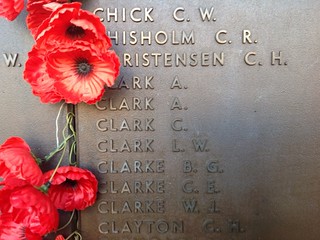Monuments tell both political and personal stories.
Professor Bruce Scates introduced us to the monuments at Chunuk Bair, Gallipoli. This is the place where the ANZACs tried to reach from the day they landed in Turkey but failed. It was known as Hill 971.
The first Allies buried at the cemetery near the top of the hill were New Zealanders. From there they could see the Dardanelles and the Narrows. The first monument erected at Chunuk Bair was put up by the New Zealanders in 1925 and is the National Monument for New Zealand. This was a great political move – the Allies have now taken over the land they could not take during the war.
In 1992, the Turks raised a monument in the same area to Mustafa Kemal Ataturk who lead the Turkish forces in 1915.
How do those left behind mourn those lost in war?
Mrs Irwin, mother of George, corresponded with the Red Cross throughout the war, then visited Gallipoli after war to find out more and make a rubbing of her son’s name on a monument.
Judge Higgins, father of Mervyn, travelled to Palestine to find a small cross, erected a large celtic cross and then started campaigning for disarmament.
Bert Crowle sent a letter to his wife while on his deathbed. Very blunt but showing love for family. His personal monument, erected by his wife and his brother, still stands.
Emily Luttrell pleaded for assistance to visit her son’s memorial in England when she was aged 66. The Government said no.
Reflect and connect
After a few videos, we are being asked to reflect on what we have learnt or feel so far. This is my first reply.
I think the most compelling of the stories to me was Bert Crowle who, even on his deathbed, was thinking of the future of his family. I wonder if he had sent home letters prior to this one and whether they were so very blunt about what was happening to him. Or did he gloss over the real aspects of war and it was only on his deathbed that he felt the need to share the negative and more personal side? How well did the government look after his family once he was dead?
Readers: Do you know of other ways people grieve, bereave or commemorate? Do you have any personal experiences?
